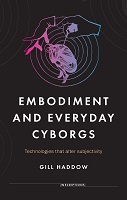
| Judul | Embodiment and everyday cyborgs : Technologies that alter subjectivity / Gill Haddow |
| Pengarang | Haddow, Gill |
| EDISI | 1st ed |
| Penerbitan | Manchester : Manchester University Press, 2021 |
| Deskripsi Fisik | 210p. :ill |
| ISBN | 9781526114198 |
| Subjek | HUMAN BODY—SOCIAL ASPECTS MEDICAL TECHNOLOGY—SOCIAL ASPECTS ORGAN TRANSPLANTATION—SOCIAL ASPECTS CYBERNETICS—SOCIAL ASPECTS IMPLANTS, ARTIFICIAL—PSYCHOLOGICAL ASPECTS SELF—SOCIAL ASPECTS |
| Abstrak | "Using a range of social science methods and drawing on the sociology of the body, biomedicine and technology, Haddow invites readers of ‘Embodiment and everyday cyborgs’ to consider whether they might prefer organs from other humans or non-human animals (known as xenotransplantation), or implantable ‘cybernetic’ technologies to replace their own? In discovering that individuals have a very clear preference for human organs but not for the non-human, Haddow suggests that the inside of our bodies may be more important to our sense of identity than may have previously been thought. Whereas organs from other (once) living bodies can contaminate the body of the recipient (simultaneously altering subjectivity so they inherit traits e.g. gender), cybernetic technology is acclimatised to and becomes part of the body and subjectivity. In organ transplantation the organ has the potential to alter subjectivity – whereas with cybernetic technology it does not alter identity but is incorporated into existing subjectivity. Technologies are clean from previous organic fleshy associations and although they may malfunction or cause infection, they do not alter identity in the way that an organ might. Yet, we are arguably creating a 21st-century identity crisis through an increasing reliance on cybernetic technologies such as implantable cardiac defibrillators (ICDs) creating new forms of ‘un-health’ and a new category of patient called ‘everyday cyborgs’ who have to develop strategies to incorporate device alienation as well as reinserting human agency over ICD activation. " |
| Bentuk Karya | Tidak ada kode yang sesuai |
| Target Pembaca | Tidak ada kode yang sesuai |
| Lokasi Akses Online |
https://library.oapen.org/handle/20.500.12657/49619 |
| No Barcode | No. Panggil | Akses | Lokasi | Ketersediaan |
|---|---|---|---|---|
| 121125192 | 306.461 Had e | Baca Online | Perpustakaan Pusat - Online Resources Ebook |
Tersedia |
| Tag | Ind1 | Ind2 | Isi |
| 001 | INLIS000000000161205 | ||
| 005 | 20250430092222 | ||
| 007 | ta | ||
| 008 | 250430################|##########|#|## | ||
| 020 | # | # | $a 9781526114198 |
| 035 | # | # | $a 0010-0425001137 |
| 082 | # | # | $a 306.461 |
| 084 | # | # | $a 306.461 Had e |
| 100 | 0 | # | $a Haddow, Gill |
| 245 | 1 | # | $a Embodiment and everyday cyborgs : $b Technologies that alter subjectivity /$c Gill Haddow |
| 250 | # | # | $a 1st ed |
| 260 | # | # | $a Manchester :$b Manchester University Press,$c 2021 |
| 300 | # | # | $a 210p. : $b ill |
| 520 | # | # | $a "Using a range of social science methods and drawing on the sociology of the body, biomedicine and technology, Haddow invites readers of ‘Embodiment and everyday cyborgs’ to consider whether they might prefer organs from other humans or non-human animals (known as xenotransplantation), or implantable ‘cybernetic’ technologies to replace their own? In discovering that individuals have a very clear preference for human organs but not for the non-human, Haddow suggests that the inside of our bodies may be more important to our sense of identity than may have previously been thought. Whereas organs from other (once) living bodies can contaminate the body of the recipient (simultaneously altering subjectivity so they inherit traits e.g. gender), cybernetic technology is acclimatised to and becomes part of the body and subjectivity. In organ transplantation the organ has the potential to alter subjectivity – whereas with cybernetic technology it does not alter identity but is incorporated into existing subjectivity. Technologies are clean from previous organic fleshy associations and although they may malfunction or cause infection, they do not alter identity in the way that an organ might. Yet, we are arguably creating a 21st-century identity crisis through an increasing reliance on cybernetic technologies such as implantable cardiac defibrillators (ICDs) creating new forms of ‘un-health’ and a new category of patient called ‘everyday cyborgs’ who have to develop strategies to incorporate device alienation as well as reinserting human agency over ICD activation. " |
| 650 | # | # | $a CYBERNETICS—SOCIAL ASPECTS |
| 650 | # | # | $a HUMAN BODY—SOCIAL ASPECTS |
| 650 | # | # | $a IMPLANTS, ARTIFICIAL—PSYCHOLOGICAL ASPECTS |
| 650 | # | # | $a MEDICAL TECHNOLOGY—SOCIAL ASPECTS |
| 650 | # | # | $a ORGAN TRANSPLANTATION—SOCIAL ASPECTS |
| 650 | # | # | $a SELF—SOCIAL ASPECTS |
| 856 | # | # | $a https://library.oapen.org/handle/20.500.12657/49619 |
| 990 | # | # | $a 121125192 |
Content Unduh katalog
Karya Terkait :